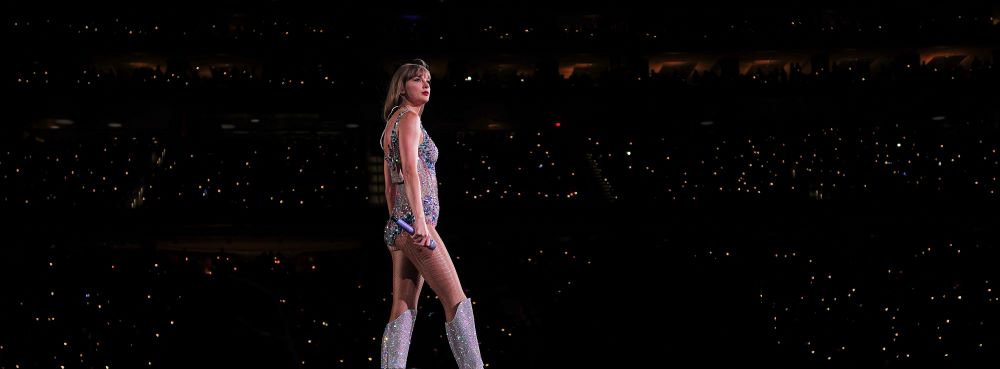
Taylor Swift performs during her "The Eras Tour." (Flickr/Paolo V)
"The Democrats' Taylor Swift election interference psyop is happening in the open," said Laura Loomer, a conspiracy theorist whom former president Donald Trump has embraced.
Fox News' Jesse Watters raised the possibility that the pop singer could be part of a Pentagon plot to get President Joe Biden reelected, claiming "around four years ago, the Pentagon's psychological operations unit floated turning Taylor Swift into an asset." This gross distortion of the truth has not cost the increasingly irresponsible and unhinged Watters his primetime slot at 8 p.m.
It is notoriously tricky to deploy influence acquired in one realm of the culture, entertainment, to another, politics. Bruce Springsteen campaigned with John Kerry in the closing days of the 2004 presidential contest and it didn't matter. Jay Z and Beyoncé, Lady Gaga and Bon Jovi, all took to the stage on behalf of Hilary Clinton in 2016 and she still lost.
With 279 million followers on Instagram, Swift undoubtedly has an enormous reach. When Swift encouraged young people to register to vote in September, 35,000 people went to the website to which she had directed them. That is more than the margin by which Biden beat Trump in three states in 2020.
The reason Republicans have concocted these ridiculous conspiracy theories about Swift, however, is not just because she has a reach that exceeds the other pop stars and the election is destined to be a squeaker. It is that the slice of the electorate who will decide the 2024 election is increasingly difficult to reach with any kind of standard political pitch.
Advertisement
Lee Drutman, in a recent Substack post, looked at the 20% of the electorate that do not fall into either partisan camp. He calls them the "Shrug Emoji" voters.
"Disaffected from both parties, and mostly disengaged," Drutman said. "They skew less wealthy, and younger, than the rest of the electorate. They defy easy ideological categorization. They vote sometimes, if they can be convinced the stakes are high enough to pay attention, or a new candidate breaks through and energizes them. The most pivotal are the least knowledgeable, an odd group for a democracy to empower."
Drutman added: "They begin with a broad cynicism towards anyone in power. If anything unites them, it is a broad anti-system animus. Establishment politicians hold an especial stink for these voters" (emphasis in original).
There is a lot to unpack there. The Founding Fathers, as well as the ancient Greeks, certainly believed that democracy could only flourish if the electorate was well informed. Americans' fetish for consumer goods and entertainment has crowded out the amount of intellectual bandwidth available for things like assessing candidates and political platforms, so Drutman's point about the most pivotal voters being the least knowledgeable is something to worry about long past 2024.
Anti-establishment sentiment was baked into the American psyche from the very beginning. The Puritans fled the established order in England, complete with biblically inspired narratives to justify their opposition to king and church. Their cultural and political biases would become dominant in early America. The founders mounted a revolution, the most anti-establishment act a people can take, and subsequent political fortunes have usually needed to include some anti-establishment fervor, from Andrew Jackson's populism to Donald Trump's.
The reason the Republicans are worried about Taylor Swift is because she crosses the usual boundaries. Democrats go to her concerts and so do Republicans. More importantly, the disaffected "Shrug Emoji" voters go to her concerts too. Everybody seemingly loves Swift. Her romance with Kansas City Chiefs' tight end Travis Kelce seems to put everyone in a good mood.
Come November, neither Swift's nor Kelce's name will be on the ballot. As Drutman explains, the American electorate is in a deep rut. Our politics is driven not by what we want but by what we fear. Polarization has combined with social media to create a desperately divided nation. The only thing most Americans agree on is that they do not want a Biden-Trump rematch, but that is exactly what they are going to get.
Those who will likely decide this election, accustomed to the comforts of our affluent society, poorly educated in civics and distracted by all the entertainments our culture has to offer, have forgotten Cassius' observation when another, earlier republic was imperiled: "The fault, dear Brutus, is not in our stars but in ourselves."








